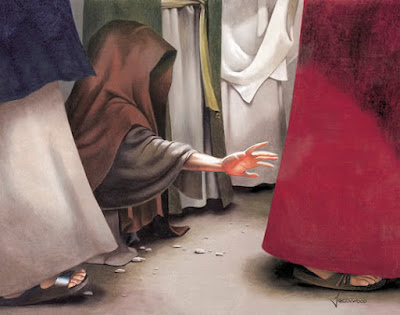Stir up your power, O Lord,
and with great might come among us; and, because we are sorely hindered by our
sins, let your bountiful grace and mercy speedily help and deliver us.
That’s
the collect we prayed just a few minutes ago, the one we pray every third
Sunday of Advent. It goes with the lighting of the third candle of the Advent
wreath, the pink candle of joy.
And
that makes perfect sense, because what could bring greater joy to the hearts
and minds of God’s people than the expectation that God will once again be
stirred by our plea and with great might come among us?
The
early part of this week—after turning in my grades in the nick of time Monday—I
spent many of my spare moments thinking about what I might say about that
today.
I
thought of the great joys of this season, the anticipation of children of all
ages, the eagerness with which we look forward to not only gifts under a tree
and a feast with our families, but the moments sharing familiar carols and kneeling
at a manager gazing in wide-eyed wonder at God become flesh to dwell among us.
And
then came Friday, and the cruel and senseless deaths of 20 mere babes and a
number of adults in Newtown, Connecticut.
How
can we light the candle of joy when our hearts are broken?
How
can we sing—at all, much less “Joy to the World”—when the worlds of so many
have been dealt a blow that will color every remaining moment of their lives?
How
can we pray and believe that God has and does and will always come among us with great might when we
continue to be so sorely hindered by the evil and tragedy that is so a part of
the human condition?
I
have just two responses that make sense to me this sad morning.
The
first is that joy is something we choose, even when we do not feel joyful.
In
other words, we tend to think of joy as only an emotion, something we must feel.
And we do feel joyful when things in our lives go well, when our children make
good grades or graduate from college. When our work is appreciated. When sick
people get well. When the love we feel toward another is returned in kind. When
the world makes sense.
But
when things do not go our way, when our love is rejected, when good people
suffer… and most of all when those we love are snatched from us and this life
in the most senseless ways, then frustration, sadness, and deep grief drive the
joy from our lives. We are bereft. We cannot imagine ever feeling joyful again.
Yet
even then, we can choose joy. Especially then, joy is a choice we make in
faith. As children of the living, Incarnate God, we go to the graves of our dreams and plans and exalted expectations,
even to the graves of family and friends, and ultimately to our own grave,
saying, Alleluia, alleluia, alleluia.
The
second response that makes sense to me this morning is to claim for our own
what John the Baptizer offers to those who had gathered to hear him preach so
long ago (Luke 3:7-18, NRSV). What should we do? they
ask.
Now
the context of today’s Gospel story is somewhat different from our own. John
has been doing what John did so well, namely preaching hellfire and brimstone.
Indeed, he has just called at least some of his listener’s a brood of vipers!
Those
remarks were most likely directed at the religious leadership of the day, who did
not take kindly to crudely dressed prophets drawing ordinary folks away from
official religion, telling them the good news of salvation at hand and
baptizing them in a river on the edge of the wilderness. John was clearly a
threat to their power and influence.
But
as is often the case, the ordinary folk, the ones with the least power and
influence, are the ones who take John’s message most to heart. To them,
calamity was at hand. And so they ask John, What
should we do?
And
John gives them simple, gentle instructions about how to live as those who have
accepted God’s love and mercy, as those who have chosen joy in faith that God
is with us.
Give
your second coat to one who has none, says John. Share your food with those who
are hungry. Don’t cheat. Don’t bully. Care for one another as God cares for
you.
These
are the same instructions Jesus the Christ gave us over and over: Welcome the
stranger, visit the prisoner, love your enemy. And today, especially in light
of Friday’s calamity, find someone who grieves and be with them in their grief.
We
cannot all rush off to Connecticut, or to the many places worldwide where violence
and suffering abound. But we can reach out in love and kindness to those who
suffer in our very own community. It is how we express the joy we have chosen
in faith, even when our hearts are heavy.
Stir up your power, O Lord,
and with great might come among us.
AMEN















